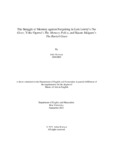| dc.contributor.advisor | Azim, Firdous | |
| dc.contributor.author | Kaiissar, Jahin | |
| dc.date.accessioned | 2021-11-24T04:38:03Z | |
| dc.date.available | 2021-11-24T04:38:03Z | |
| dc.date.copyright | 2021 | |
| dc.date.issued | 2021-09 | |
| dc.identifier.other | ID 20363003 | |
| dc.identifier.uri | http://hdl.handle.net/10361/15653 | |
| dc.description | This thesis report is submitted in partial fulfilment of the requirements for the degree of Masters of Arts in Teaching to Speakers of Other Languages, 2021. | en_US |
| dc.description | Cataloged from PDF version of thesis. | |
| dc.description | Includes bibliographical references (pages 44-46). | |
| dc.description.abstract | Since memory studies is a continuously expanding and contentious interdisciplinary field, scholarly interest in it has grown considerably in recent times, especially within the humanities. Situated in memory studies, this dissertation examines the interplay between memory and power, between forgetting and individual/collective memory, and between remembering and resistance in three selected novels: Lois Lowry’s The Giver, Yoko Ogawa’s The Memory Police, and Kazuo Ishiguro’s The Buried Giant. Maurice Halbwachs and Jan Assmann’s theories on collective memory, Paul Connerton and Aleida Assmann’s concept of repressive erasure/forgetting, and Michel Foucault’s ideas on power and resistance form a vital background for this dissertation. Each of the novels under discussion unforgettably portrays fictive worlds where memory, or rather its almost total eradication, is used as a means of controlling and manipulating citizens. In their memory-deprived worlds, the major characters within each novel strive to remember their past against the collective, repressive forgetting imposed on them by people in power. By tracing the essential themes through a critical analysis of the novels, this dissertation aims to provide a focused insight into the questions of how collective forgetting is imposed, how imposed forgetting affects individual and collective memories, and how remembering is a way of resisting those in power. | en_US |
| dc.description.statementofresponsibility | Jahin Kaiissar | |
| dc.format.extent | 46 pages | |
| dc.language.iso | en | en_US |
| dc.publisher | Brac University | en_US |
| dc.rights | Brac University theses are protected by copyright. They may be viewed from this source for any purpose, but reproduction or distribution in any format is prohibited without written permission. | |
| dc.subject | Memory studies | en_US |
| dc.subject | Power | en_US |
| dc.subject | Individual memory | en_US |
| dc.subject | Collective memory | en_US |
| dc.subject | Remembering | en_US |
| dc.subject | Resistance | en_US |
| dc.subject | Forgetting | en_US |
| dc.subject.lcsh | Memory -- Periodicals. | |
| dc.title | The Struggle of Memory against Forgetting in Lois Lowry’s The Giver, Yoko Ogawa’s The Memory Police, and Kazuo Ishiguro’s The Buried Giant | en_US |
| dc.type | Thesis | en_US |
| dc.contributor.department | Department of English and Humanities, Brac University | |
| dc.description.degree | M. in English | |

